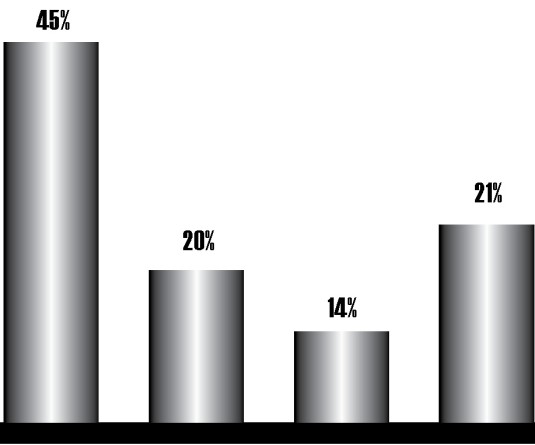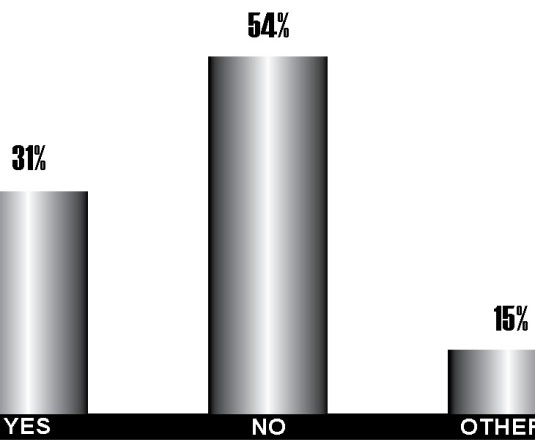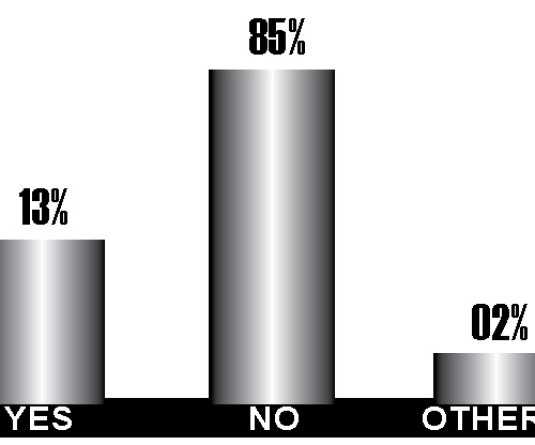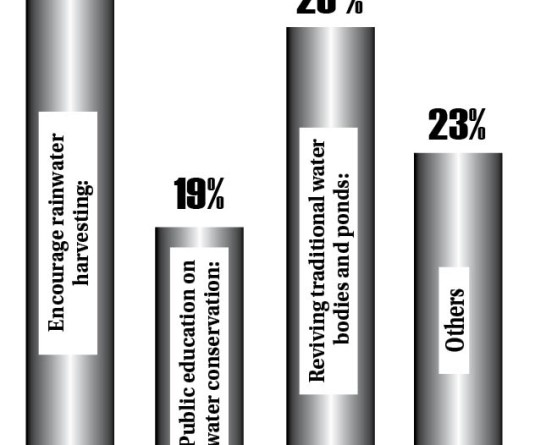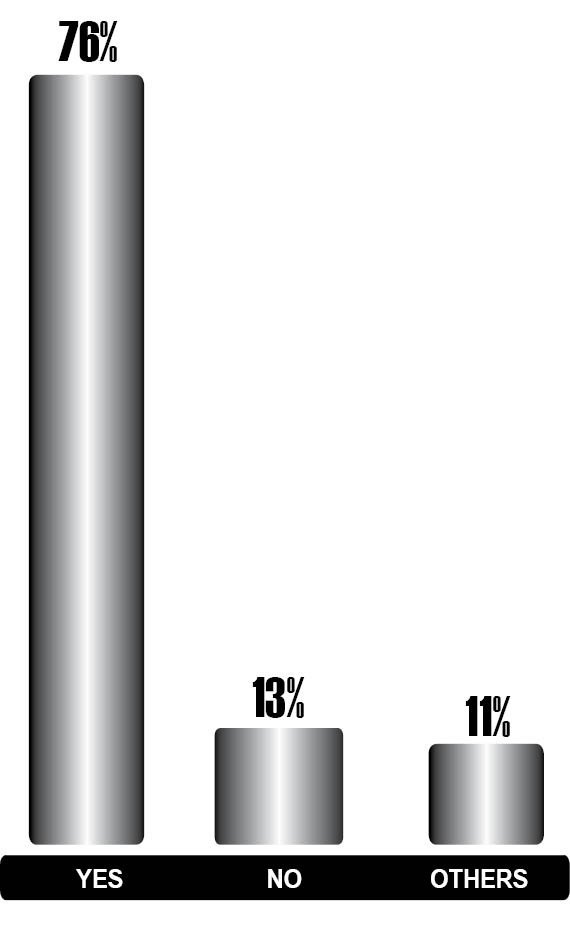
Some of those who voted YES had this to say:
• Yes, in every possible way. Because the govt happens to be none other than our own corrupted leaders who are all eager to get their own people to suffer by suppressing development. There are those govt servants, or rather, govt masters, who are land grabbers and openly cheat other people for their own good (in the name of development). Where are my rights? And where is the development?
• Yes. In Nagaland, the land belongs to the people and it is for the people to decide who to develop their land and in what manner in should be developed. It is funny that the Nagaland state government has been saying that the pace of development is being effected in Nagaland because of the land holding system. If the land did not belong to the people, just imagine what would have happened to the Nagas and it is certain that our condition would have been worse off. The Nagaland government needs to respect the people, who are custodians of the land. The government should provide a clear direction and a plan as to how they wish to develop, rather than trying to grab land in the name of development, without even compensating the people. This is not right at all and it shows they have no respect what so ever for the people.
• YES. The government has eroded people's right over their land (or minerals, resources). Take the example of Chanpang oilfield in the Lotha regions. The recent debate has been: Does the state government have a stake to claim any monetary returns from the oil of the Lothas? The state government wants half of the royalties (the other half goes to villagers and land owners, etc). Have they bought the land? Does the constitution give them any right over the land? NO, and NO. Yet, out of the 16% the state government wants 8%- their reason because they are the government and therefore they can unanimously claim half of the royalties. Is this fair on the Lothas and their ownership of their ancestral lands? Building national highways or constructions of govt. buildings your decision alone cannot decide over the community's. In customary laws everyone, irrespective, have to give way to 'common roads' and paths. The state govt. may not be exploited there but the common people are needing to comply to one person's autocracy above the rest.
• There have been a lot of reports about the government trying to widen the highways, and they blame the people for not giving them the land on which the roads are to be made. The government should not be blaming the people, rather they should take responsibility. The state government should educate the people on the proposed plan so that the people can make an informed decision. It is wrong for the government to make their own plan without the people participating in the decision making, and then expecting the people to accept their proposal. This is not democratic. The government should get the people involved in decision making. Furthermore, since there will be displacement of people and families while undertaking projects such as road-building; it is the duty of the government to provide adequate compensation. Land in Nagaland is not just a piece of commodity, it is their livelihood and therefore the government is duty bound to provide compensation in exchange for the land.
• I cannot comply with the state government's wish to have half of the royalties because it is the 'guardian of the state'. Yes, article 371A is there which reserves our rights or voice but more importantly tribal lands are tribal people's. An Angami cannot ask for 10% of the royalties because all the proceedings were done in Kohima, Nagaland state's capital. Where is the rest of the 84% oil returns going? Surely, a big chunk will come back to the Indian (central) government after foreign companies have taken a share. That return can be channelled into the state, supervised by the state government FOR the development of the state. Why is the state government badgering the tribal community on this issue for a royalty that is deservedly theirs? In fact, according to customary laws, or ethnic indigenous rights they should decide and benefit from all the profits on their land. But unfortunately these don't things don't happen, already a lot of oil is being extracted from underground by Assam. I think we also need to stop thinking that the state government is solely their for 'our protection' or for our interests. Because in this case it shows how unconsciously we can get exploited. If we do not push, challenge or confront the government they, in turn, will also not act in a just way
• Yes, in most cases our govt. too erodes the right of common people with namesake developments. Although we have special framework for our land rights, those at the helm including affluent leaders play pivotal roles to negate our deemed rights, majority thru' backdoor, one-sided rulings... right under our noses. And we, on our part, let it happen which must be checked stringently.
• Of course, the list is too long... Oil, coal and other minerals, natural forest resources, infrastructures e.g, industries, building projects, road, air and rail transport, hydro projects, security, food and health... They always deal us the same muddled cards with the same old excuse... for development.
• Yes, Because Nagas has not enough idea to make a better world. burning jungle, cutting fruit tree, using many uneducated army and not understand the strength of unity
• Yes, very much, in a land like ours with given considerations or provisions. If the government is for, by and of the people, i suppose they should even be doing more than what people ask... One example, the Singur land row!
Some of those who voted NO had this to say:
• No. In Nagaland, all land is owned by individuals, villages, communities etc. in short the govt. has zero land holdings. sometimes the development efforts by the govt. is hindered due to encroachment, land acquisition problems, lack of sufficient space/land for building of infrastructure and developmental activities. Compromise, sacrifice from the part of landowners, mutual respect for each others rights can be a solution for the common benefit of all stakeholders.
• Major developmental potential is stunted by the complicated system of land ownership in Nagaland. When land-based resources like oil and other energy reserves cannot be tapped, there is no capital generation to feed imperatives like roads, bridges and other utilities. Potential employment for local people in the core plants and other feeder industries is not possible. The full economic cycle can't be realised under the present system. People are also notorious for seeking exorbitant rates as compensation. In this rarified atmosphere it is well nigh impossible for investors to enter the state. A collaborative system where, despite community ownership of land, the govt retains at least notional control over land rights and also ensures that plants so set up have a reasonable percentage of local populace in the workforce is the answer. Prosperity is the only result. That's a reasonable bargain for the greater good of our society where, besides the mandatory compensation for land-loss, a secure future is assured. We need to understand this dynamics if we want our children to have a better life. The Acquisition Act allows some arbitrary provisions in favor of the govt, where once a declaration/notification is made, people have no choice but to agree to part with their property/land. This is indeed debatable in a democracy. But, for the greater good of society, something has got to give. Article 371 A in case of Nagaland becomes a 'rogue' in the path of development. Where benefits would accrue to the people in general, govt should have a greater say in land matters. Development will never come without sacrifice.
Some of those who voted OTHERS had this to say:
• Nagaland is the only state in India where the land belongs to the people. In all other states of India, the people have given their land to the Indian government. So Nagas must at all cost protect their land, because without their land, the Naga people will have no control over their lives. The Nagaland state government for their own personal greed should not compromise this unique situation of the Nagas as the rightful owners of their own lands.
• I would neither say Yes nor No. As some of us have mentioned above, it has vis-a-vis policy. I see Antonion Granci's theory of Hegemony in this regard. For Gramci, the State's hegemony has intrigued toward developing another hegemony of the citizens (Gramci, 1999, 506). In the context of the Naga society, State's policy creates citizen's having individual's policy based on the individual's ownership which leads to any decision making individually. This trend effects the people in general. Therefore, I can neither have a bias for the citizens nor for the State in regard to anything that has to do with the exploitation of Citizen's Rights, in the context of the Naga society.
• Why only oil? may be it has more market value. I wish people were more conscious of forest resources. More than half our forest resources are gone and mostly exploited not by the State. Not that i support State. but sustainability should always be prefix with the issue of development. The question of oil is more than revenue, it is the BIGGER question of environment and exploitation.
• Compensation is a statutory right. Having said that, our people should also think about the future. Money is an immediate but temporary compensation. In other states, the base compensation rates are worked out on the basis of the annual benchmark valuation on the particular type of land (agricultural land or homestead land or plantation or commercial), which is the highest sale transaction recorded for that type/class of land immediately prior to the scheduled valuation. This factors in standing assets like buildings, structures, crops, plantation over the base land rate. Over this is added the 10% solatium (emotional rescue in a way) which is supposed to cover costs for relocation. Some states have been rehabilitating people via land exchange, where govt/company give them parcels of land elsewhere with dwelling units in tow, besides the compensation money. Due to zero revenue records on land, it is not possible to implement the same in nagaland. What community as a whole should be bargaining for is right price, possible relocation to a developed area (land being scarce, this is not always possible) and above all, employment at the proposed plant for the local community which is being displaced. Guaranteed jobs are any time better than money in the long run.


